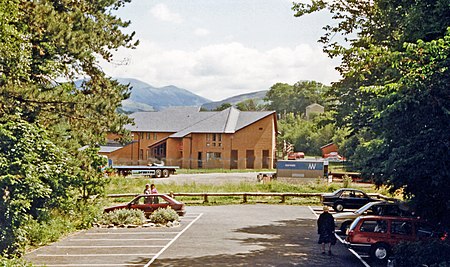Cockermouth railway station

Cockermouth railway station was situated on the Cockermouth, Keswick and Penrith Railway and served the town of Cockermouth, Cumbria, England. The station opened to passenger traffic on 2 January 1865 and closed on 18 April 1966. The station was the second to be built in the town. The original Cockermouth & Workington Railway station closed to passengers when the CK&PR station opened on an altered alignment, though it remained in use as a goods station until 1964. The latter station was immortalised in 1964 in the song "Slow Train" by Flanders and Swann. All traces of the station are now gone as the site is now occupied by The Cockermouth Mountain Rescue Base and the Cumbria Fire and Rescue Service. Running down the left hand side of The Fire Service building is the old track bed, now a public walkway; there are original bridges and features surviving to this day.
Excerpt from the Wikipedia article Cockermouth railway station (License: CC BY-SA 3.0, Authors, Images).Cockermouth railway station
New Road,
Geographical coordinates (GPS) Address Nearby Places Show on map
Geographical coordinates (GPS)
| Latitude | Longitude |
|---|---|
| N 54.66 ° | E -3.365 ° |
Address
Cockermouth
New Road
CA13 9PS , Riverdale
England, United Kingdom
Open on Google Maps









